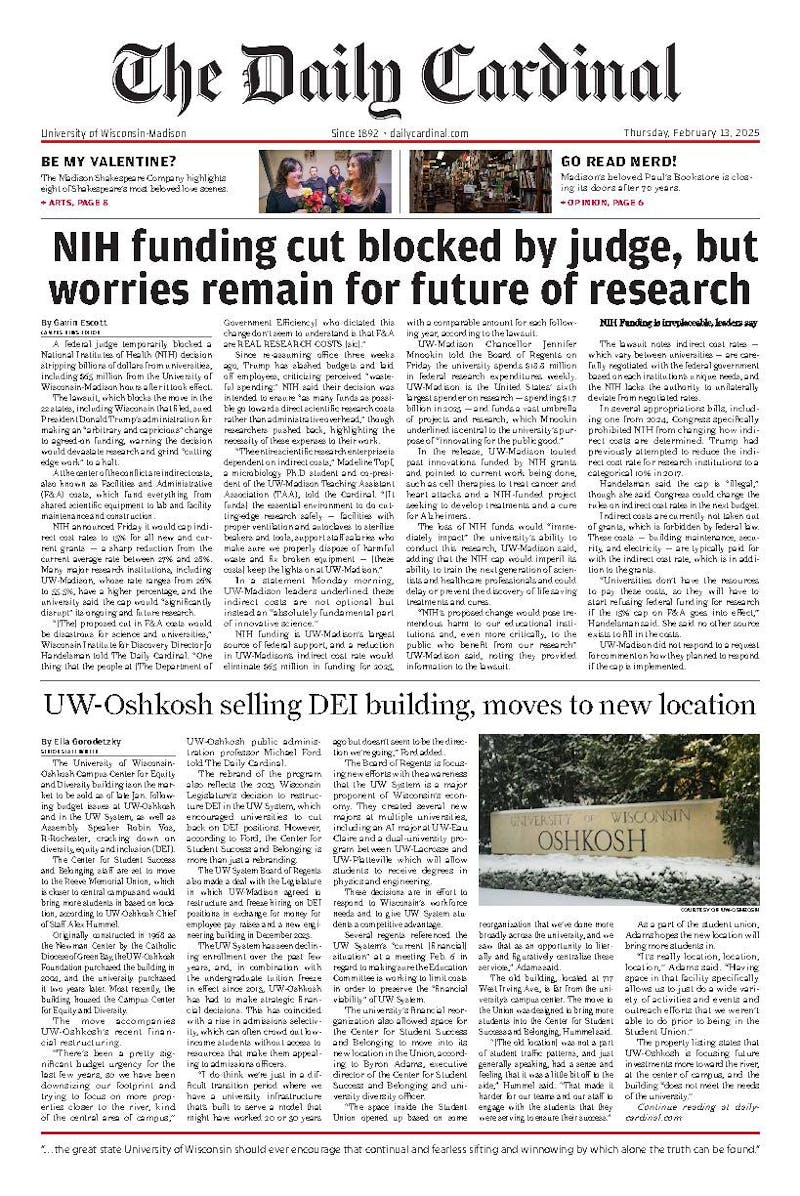Chloe Shomo, a University of Wisconsin-Madison junior, works two jobs and receives Pell grants under a university program to pay for tuition. It’s still not enough, Shomo said.
The program, Bucky’s Pell Pathway, gives Pell-grant eligible Wisconsin residents enrolled in on-campus programs grants, scholarships and work study “sufficient to meet their full financial needs,” according to UW-Madison.
For Shomo, the program pays her full tuition and provides roughly $1,000 per month to use for off-campus living expenses. But Schomo told The Daily Cardinal the money, which she also uses to pay for her meal plan and books, is still not enough.
“Even though I was on a full 100% scholarship, it didn’t even cover [the lowest dining plan option],” Shomo said. “With freshman year, I still owed the university money for my housing and my meal plan, which didn’t even cover all the meals I would need to eat if I wanted to eat three meals a day.”
Her plan provided only 10 meals per week, not even half the 21 needed to eat three meals a day.
Roughly 20% of UW-Madison students rely on Pell grants to cover tuition and living expenses, although that proportion has been steadily decreasing since 2014. Program recipients said food isn’t the only thing the program fails to cover.
A growing body of research finds that mixed aid programs — those that combine financial aid with student support services — are stronger than financial aid alone, the Committee on Undergraduate Recruitment, Admissions and Financial Aid Student (CURAFA) said in a 2018 report.
Although this is in reference to Bucky’s Tuition Promise as opposed to Bucky’s Pell Pathway, which is itself an extension of the 2018 tuition promise, the recommendations the report provided have not been put into full action.
Types of support services include summer advising, enhanced counseling, college coaching, peer mentoring, community building activities and proactive efforts to navigate college. These programs are the kind UW-Madison junior Joy Rasch said she would’ve wanted when she was struggling during winter break.
“The only things that were advertised as people were leaving [for winter break] was the house fellow number to call if there was an emergency,” Rasch said. “[Programming] would have made me feel less alone and empowered me to pick out something I wanted to do or get involved in.”
Bucky’s Pell Pathway fails to fully cover essential food needs, users say
Food insecurity is a problem experienced by roughly 31% of UW-Madison students, according to an independent survey conducted by student government leaders and Schomo, who added it affects many parts of the college experience.
Food insecurity is a major contributor to decreased academic performance and negative physical, social and mental health outcomes in students, according to the National Institutes of Health.
For Rasch, Bucky’s Pell Pathway’s inability to cover food when she lived in the residence halls over winter break last year highlighted flaws in the program.
“There was a lack of where I could get food from. I would have to borrow rides from other people and be careful with the money I was spending, and I didn’t know how to cook at that time [due to my parents never teaching me],” Rasch said.
Federal regulations restrict UW-Madison from considering periods of time when students aren’t enrolled, like winter break, in determining financial aid, Assistant Director of Media Relations Greg Bump told the Cardinal in an email. Bump said students can pick up free reheatable meals and free loaner Microwaves from University Housing during break.
CURAFA recommended that the university should “allocat[e] any new funds made available to Bucky’s Tuition Promise to meet students’ tuition and non-tuition needs” in 2018 in addition to adding on academic and social support services to the program.
The UW-Madison Faculty Senate met multiple times between September 2018 to March 2019 to adopt CURAFA’s guidelines, though a failure to reach a quorum meant no action was taken.
“They can definitely improve on talking about the reality of food insecurity,” Rasch said. “[There needs to be] sincerely more one-on-one work because it’s so complicated.”
Change is happening
The informational website for Bucky’s Pell Pathway does not currently tell visitors what meal plans are covered under the program, nor does it provide links to resources for food insecure students on campus.
However, advocacy from Shomo led to an Associated Students of Madison working group that created the Basic Needs website, which includes links to food assistance and health service resources.
Shomo, who researched and dictated information on the website, said she called food banks and other food insecurity resources for specific hours, particularly during the holidays, to create a map of all resources for ease of use.
Ultimately, the food plans that students are able to access depends on what their individual financial need is, something unexpected for Rasch. Lack of one-on-one support led her to choose a meal plan that did not meet her needs.
“Looking back on it now, I could have gone for the unlimited and it would have still been paid for,” Rasch said.
In some cases, students struggle to receive sufficient scholarship based on the amount their family can actually pay, as Pell grants only cover estimated cost minus expected family contribution reported on a student’s FAFSA. Student loans are often the next step, which can lead to debt.
UW-Madison announced on Jan. 28 that President Donald Trump’s freeze on federal grants and loans will not apply to student aid programs during this semester, including Bucky’s Pell Pathway.
On Feb. 3, a federal judge extended a temporary pause on the federal loan freeze program over constitutional concerns. The loan freeze is not expected to apply to Pell grants.






